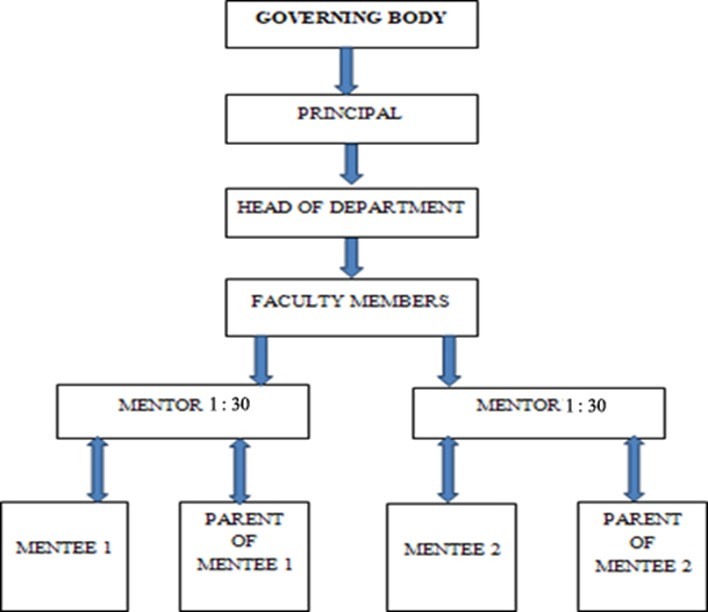Best Practices -II
Mentoring System at Tapasya Degree College, Lakdi ka Pul
The mentoring system at Tapasya Degree College, Lakdi ka Pul, is designed to provide personalized guidance and support to students, fostering their academic, personal, and professional development. The system pairs students with experienced faculty members who act as mentors, helping them navigate their educational journey while promoting holistic growth. Through this system, the college aims to ensure that every student has access to the resources and support necessary to succeed in their academic and career pursuits.
Objectives of the Mentoring System
- Academic Success
The primary goal is to guide students in their academic endeavors, helping them achieve academic excellence by offering advice on study techniques, course selection, and exam preparation. - Personal Growth and Development
The mentoring system seeks to foster personal growth by supporting students in developing crucial life skills such as time management, communication, and emotional resilience. - Career Guidance
Mentors help students identify potential career paths, explore job opportunities, and develop the skills needed for success in their chosen field. - Emotional and Psychological Support
The mentoring system provides a safe and supportive space for students to discuss personal challenges, ensuring emotional well-being. - Holistic Development
It aims to help students develop both academically and personally by guiding them in extracurricular activities, leadership roles, and community engagement.
Roles and Functions of Mentors
- Academic Guidance
Mentors assist students in selecting courses, understanding academic requirements, and developing effective study plans to enhance their academic performance. - Career Counseling
Mentors provide valuable insights into career options, professional skills, and opportunities for further education or internships, helping students make informed decisions about their future. - Emotional Support
Mentors act as trusted advisors, offering emotional and psychological support, helping students deal with stress, anxiety, and other challenges that may arise during their academic journey. - Role Modeling
Mentors serve as role models, demonstrating professional behavior, ethical practices, and personal responsibility, inspiring students to adopt these qualities in their own lives. - Skill Development
Mentors guide students in the development of essential skills like communication, leadership, teamwork, and critical thinking, which are important for both academic success and career progression. - Monitoring Progress
Mentors regularly check on students’ academic and personal progress, identifying areas where additional support may be needed and offering constructive feedback.
Roles and Functions of Mentees
- Active Participation
Mentees are expected to actively engage with their mentors, seek advice, and participate in discussions to gain maximum benefit from the mentoring relationship. - Goal Setting
Mentees should set academic and personal goals in collaboration with their mentors and work towards achieving them with focus and commitment. - Self-Reflection
Mentees should regularly reflect on their progress and challenges, openly discussing any difficulties they face with their mentor to work on solutions. - Taking Responsibility
Mentees are responsible for following through on the guidance provided by their mentors, taking initiative in their academic and personal development. - Openness to Feedback
Mentees must be open to receiving constructive criticism and feedback from their mentors, using it to improve their performance and behavior. - Building a Professional Relationship
Mentees should maintain a professional and respectful relationship with their mentors, valuing their time and expertise.
Benefits of the Mentoring System
Benefits for Mentors
- Personal Satisfaction
Mentors experience personal satisfaction from contributing to the academic and personal development of students, seeing them grow and succeed. - Professional Growth
By mentoring students, mentors also develop valuable skills such as leadership, communication, and problem-solving, which enhance their professional capabilities. - Strengthened Connections
Mentoring fosters stronger bonds within the college community, creating a sense of collaboration and mutual support among faculty and students. - Impact on Institutional Growth
Mentors play a crucial role in shaping the overall culture of the institution by guiding students toward success and creating a supportive learning environment.
Benefits for Mentees
- Academic Support
Mentees receive personalized academic guidance, which helps them overcome challenges, stay on track with their studies, and achieve better results. - Career Insights
Mentors provide career advice and guidance, helping mentees make informed decisions about their future and offering valuable networking opportunities. - Personal Growth
Mentees develop important life skills such as time management, decision-making, and communication, which contribute to their personal growth. - Emotional Support
Having a mentor provides mentees with a source of emotional support, helping them navigate the stresses and challenges of academic life and personal issues. - Increased Confidence
The guidance and encouragement provided by mentors help mentees build self-confidence, empowering them to pursue their goals with determination.
Orgonogram of Mentoring System

